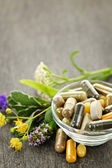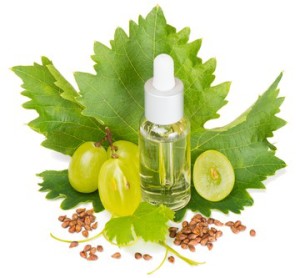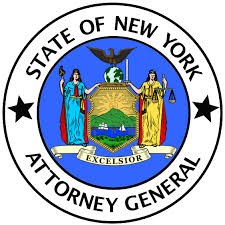How Can You Be Sure You Are Getting What You Paid For?
Author: Dr. Stephen Chaney
 Two weeks ago the headlines claimed that most supplements containing grape seed extract were bogus. Just last week the New York Attorney General claimed that four of the largest retailers in the state were selling bogus herbal supplements.
Two weeks ago the headlines claimed that most supplements containing grape seed extract were bogus. Just last week the New York Attorney General claimed that four of the largest retailers in the state were selling bogus herbal supplements.
We already knew that it is “buyer beware” in the food supplement industry. Is it really this bad? Are most herbal supplements a waste of money? How can we be sure that we are getting our money’s worth when we buy herbal supplements?
Do Herbal Supplements Work?
Supplements Containing Grape Seed Extract
 The headlines about supplements containing grape seed extract were based on a recent study by botanical and medicinal chemistry experts at Rutgers University (Villani et al, Food Chemistry, 170, 271-280, 2015). They obtained 21 commercially available supplements containing grape seed extract from vitamin supplement retailers, supermarkets and online vendors.
The headlines about supplements containing grape seed extract were based on a recent study by botanical and medicinal chemistry experts at Rutgers University (Villani et al, Food Chemistry, 170, 271-280, 2015). They obtained 21 commercially available supplements containing grape seed extract from vitamin supplement retailers, supermarkets and online vendors.
The scientists used HPLC/UV/MS to analyze the supplements for the polyphenols that should be found in authentic grape seed extracts. (HPLC/UV/MS is an analytic method that is the gold standard for identifying and quantifying the chemical composition of the final product. However, it is a very expensive procedure, and many manufacturers do not use it.)
The results of their analysis were quite alarming.
- Only 6 of the 21 products tested had the specific polyphenols found in authentic grape seed extract.
- 9 of the samples had less than 15% of the polyphenols found in grape seed extract.
- 5 of the samples had less than 3% of the polyphenols found in grape seed extract.
- One of the samples had no detectable grape seed extract
- 9 of the samples contained polyphenols that were characteristic of peanut skin extracts rather than grape seed extract. Peanut skin extract is a much cheaper source of polyphenols than grape seed extract. Substitution of peanut skin extract for grape seed extract is a concern because:
- While polyphenols from peanut skin extract have health benefits, they have not been tested. There is currently no clinical evidence that they are beneficial.
- There is no label information on the products indicating that peanuts were used in their manufacture. This could be a concern for people with peanut allergies.
- 3 of the samples contained polyphenols that were more characteristic of pine bark extract than grape seed extract. Again this is a concern because that particular blend of polyphenols has not been shown to provide the same health benefits as grape seed extract.
The authors concluded that “adulteration of grape seed extract in commercial preparations is a significant problem.” They suggested that substitution of much cheaper polyphenol sources such as peanut skin extract or pine bark extract offered significant “economic gain” to the manufacturers.
They went on to say “due to reliance of inferior…assays [or complete lack of quality control assays in some cases] across the value chain, adulteration can go undetected by others in the distribution chain, such as those involved in distribution, packaging, wholesale and retail sales.”
To put that in lay terms it means that suppliers and manufacturers often cheat by substituting cheaper polyphenol sources, primarily for financial gain. Furthermore, because most companies don’t use high cost quality control assays such as HPLC/UV/MS they actually have no idea whether their products actually contain grape seed extract or not.
Supplements Containing Ginko Biloba, St. John’s Wort, Ginseng & Echinacea
The recent headlines about ginko biloba, St. John’s wort, ginseng, echinacea and other herbal products arose from an announcement by the New York Attorney General the he had just ordered GNC, Target, Walmart and Walgreens to take a number of herbal supplements off their shelves because almost 80% of them didn’t contain the ingredients listed on the label or contained non-listed ingredients.
Specifically, the Attorney General claimed that:
- The ginko biloba and St. John’s wort supplements that they tested from those stores did not test positive for active ingredients.
- Ginseng and Echinacea supplements also failed their tests.
- In some cases the supplements contained no organic material. They contained sand instead of active ingredients.
 The Attorney General claimed that these and other herbal supplements they tested were bogus. Even worse, they were deceptive and could endanger people’s health. For example, people generally use St. John’s wort to relieve depression. If the supplement is bogus, they are not just wasting money. Their mental health is also being compromised.
The Attorney General claimed that these and other herbal supplements they tested were bogus. Even worse, they were deceptive and could endanger people’s health. For example, people generally use St. John’s wort to relieve depression. If the supplement is bogus, they are not just wasting money. Their mental health is also being compromised.
While the Attorney General’s announcement is alarming, it is also a bit misleading. It is based on an analytic method called “DNA barcoding”. In simple terms, DNA barcoding means that DNA is extracted from the sample and the genetic information in that DNA is compared with the genetic information characteristic of the herbal ingredient.
DNA barcoding is an important analytic test that every manufacturer should use to validate the identity of their herbal raw ingredients. However, DNA is often removed in the process of preparing an herbal extract, so DNA barcoding is an inappropriate assay to use for validating the quality of the finished product. Assays such as the HPLC/UV/MS are more appropriate or the final product.
In short, the Attorney General identified a potential problem with the herbal supplement industry, but further tests are required before we know how significant the problem actually is. The most troubling aspect of the whole incident is that some of the retailers had not run their own quality controls on the products, so they actually had no idea whether the products they were selling were bogus or not.
How Can you Make Sure the Supplements you Buy Aren’t Bogus?
Now that you know that many herbal supplements may be bogus, how do you protect yourself? How do you make sure that you are not wasting your money and jeopardizing your health?
The answer is actually pretty simply.
- Ignore the slick marketing.
- Don’t base your decision on price alone.
- Do your research. Only choose reputable companies that do quality controls on both the raw ingredients and the finished product.
The Bottom Line
Herbal supplements have been in the headlines lately, and the news isn’t good.
- One study (Villani et al, Food Chemistry, 170, 271-280, 2015) reported that only 6 out of 21 supplements listing grape seed extract on their label actually contained pure grape seed extract. The rest were adulterated with less expensive polyphenol sources which may not provide the same health benefits, such as peanut skin extracts and pine bark extracts. That report was based on HPL/UV/MS, which is the gold standard of quality controls assays for herbal supplements.
- Two weeks later the New York Attorney General ordered GNC, Target, Walmart and Walgreens to stop selling herbal supplements containing ginko biloba, St. John’s wort, ginseng, echinacea and other herbal ingredients. He claimed that 80% of the supplements tested didn’t contain the ingredients on the label and some contained sand instead of any active ingredients. His claim was based on DNA barcoding, an assay that is appropriate for identifying the herbs used in manufacturing the supplements, but is not valid for determining whether the finished product contains extracts prepared from those herbs. In short the Attorney General’s report identified a potential problem with those supplements, but further tests will be required to determine how significant that problem is.
- Both reports serve to remind us that many supplement manufacturers fail to run adequate quality control tests on their products. Neither they nor you know whether their products actually contain any active ingredients. Your best bet is to choose food supplement companies that run appropriate quality controls on both their raw ingredients and on their final products.
These statements have not been evaluated by the Food and Drug Administration. This information is not intended to diagnose, treat, cure or prevent any disease.
